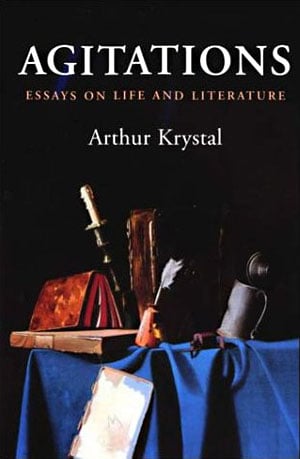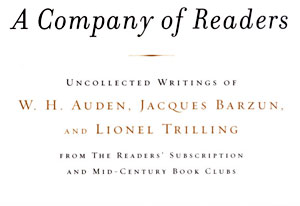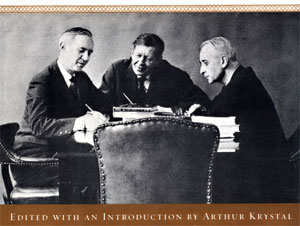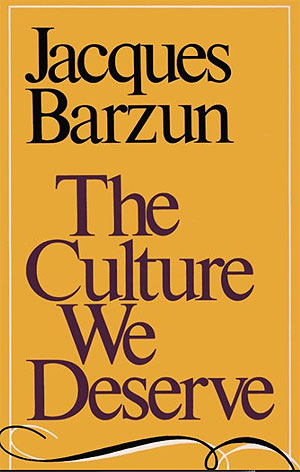In my previous post, I talked about the essay as a form, as a showcase both of thinking and for thinking, for exploring a subject in all of its contradictory complexity and not, as it more often manifests these days, as a forum in which a writer merely hammers away at a point with which its reader likely already agrees.
Arthur Krystal is a favorite among contemporary practitioners. His work displays an irrepressible commitment to independent thinking and eventful writing. “My Holocaust Problem,” a piece from his latest book The Half-Life of an American Essayist, should be mandatory reading for…well, it should be mandatory reading. It isn’t available on the web, and as it might take a day or two before you get your hands on a copy, I offer, for your interim entertainment, a few questions with Krystal.

In 1996, in a much-discussed essay for this magazine called “Closing the Books”, you meditated on the curious state at which, at midlife, you had arrived. You later described the essay and the state it sketched in the introduction to your first book, Agitations (Yale, 2002): “Why should I,” you wrote, “someone who had spent much of his life reading, editing, and writing about books—find it nearly impossible to read contemporary fiction, poetry, and criticism or, for that matter, to reread the great books of the past?” I wonder, a dozen years on, to what degree your reading reflex may have been refreshed. Have you opened the books again?
The ability to respond to prose and poetry hasn’t entirely disappeared, but it has been dulled. This is a dicey business to discuss. There are many people who still depend on novels and poems for enjoyment and intellectual stimulation, and they tend to dismiss someone who feels differently. Clearly, I’m either depressed or I just don’t get it. Thing is, I’m not on meds, and since I believe that I do “get” Joyce, Pound, Beckett, Larkin, and Auden, I also believe that I’m able to appreciate what novelists and poets are doing today. And yet very little strikes my fancy. I can’t prove it, but I think the fault lies in the literary firmament and not in me.
It’s the firmament’s fault, is it?
I suppose I can’t absolve myself entirely of my views, can I? As I acknowledged in “Closing of the Books,” my inability to be moved by current fiction may be a function of age, my age. As the body droops, one’s interest in things not of the body may droop as well. Therefore, people who want to write should ignore me. After all, what do I know besides what I know? Glad you asked. I know that one has to be a genius, a veritable genius, these days to write an original and historically significant poem or novel. The same applies to painting and classical music. And by “significant,” I mean something that will not only astonish but will change forever how we regard the form. And as you know, I don’t think this is possible anymore. And this, too, is a function of age, the world’s age. When an art form is just emerging, when an aesthetic movement is still developing, genius isn’t necessary to create memorable works. Talent and knowledge are sufficient. Geniuses arise, of course: Beethoven, Cervantes, Shakespeare, Vermeer, Picasso, Joyce, but you’ll also find a great number of tillers in the field who do interesting work by virtue of the fact that such work hadn’t been done before.
Such as?
I don’t think Richardson, Defoe, and Fielding were geniuses, yet their work is important. And when modernism flourished, writers like Ford, Forster, Conrad, Lawrence–none of them a genius, in my opinion (though Conrad comes the closest)–wrote wonderful novels. Bach, of course, was a genius, and so were Da Vinci and Raphael, but think of all the painters and composers during the Renaissance and the Baroque Period who created fantastic works. And think of all the good movies that got made in the Twenties and Thirties by people who were smart and competent but hardly geniuses. Leaving film aside, since it’s a relatively recent art, the arts as we know them have run their course. You can argue this until your face is blue, but it won’t change the historical fact. Time and technology wait for no artist, and unfortunately history has seen fit to alter our sense of time by the invention of new technologies. That and the inevitable etiolation of genres and formal methods of creation now account for the dearth of great art. Can I be wrong? I suppose. You could argue that the idea of “greatness” is itself a false category, an artificial and socially constructed yardstick. But if we’re talking about the human need to create and respond to momentous works of human endeavor, then, please, show me a poet or a novelist of whom one can say, as Eliot said of Yeats: “He was one of those whose history is the history of their own time, who are part of the consciousness of an age which cannot be understood without them”?
I see a different significance in Eliot’s quote. It isn’t that there are no poets or novelists today who are part of “the consciousness of [our] age which cannot be understood without them”, but that the culture no longer takes seriously critics who make such claims. Critics now have to waste time remedially, arguing for the importance of art in a way that Eliot never would have thought to argue. The minority that was paying attention to Eliot the critic, not to say reading Yeats the poet, needed little convincing that art was the place you went to for deep information about being. Whereas now, the proliferation of books with titles like “Why Literature Matters” and “Why Poetry Matters” defend a kingdom that has been conquered: not the kingdom of art, but the little fiefdom of intellectual life that took art’s centrality very much for granted. Fred Seidel, for one, is a poet who, to my mind, is a great artist, challenging the form while documenting, with uncomfortable conscientiousness, the grim stupidities of our self-involved age. And yet I ask poets about him and they say who?
What you say is true, but let’s not forget that Shelley was defending poetry against charges of frivolousness by Jeremy Bentham and Thomas Love Peacock. Macaulay, who wrote poetry, also thought it required a certain unsoundness of mind. The novel, too, had its detractors, as did opera and certain styles of painting. The reason that Arnold was defending poetry as late as 1870 is that the notion of art’s irrelevance has always had a certain currency, especially since the advent of science. So while I take your point that the assumed centrality of art is a thing of the past, I also think that this centrality describes a somewhat limited past–in fact, a Romantic and modernist past. The postmodern world, even as it summons a defense of literature, cannot save literature. I don’t say that good poems or novels can’t be written today; I just feel that that they can’t have the significance they once had, and this is a terrible thing to admit. Frederick Seidel is certainly an arresting poet, but the fact remains that this age cannot cede to poets the importance that earlier poets could aspire to, and this, I think, works subliminally to their disadvantage.
I don’t expect readers or writers to buy into this. And simply because I believe it doesn’t mean that I’ll push books away from me. In point of fact, I’ll still pick up the occasional well-received novel–Tree of Smoke, Saturday, Netherland, Gilead–and I’ll duly note the author’s skills and intelligence. But ultimately all disappoint–disappoint because they don’t cause me to reevaluate my opinions about fiction or about life. This doesn’t mean that the novels don’t work as novels; they just don’t increase my sum of knowledge in a truly significant way. Nor does it mean that I don’t enjoy reading. Actually, I have to read; I still have, as we used to say, a jones for reading. So I’ll start a lot of books and once in a while even finish one. I thought Annie Proulx’s short story “Brokeback Mountain” pretty damned good, and there are parts of Roth’s American Pastoral and The Human Stain that impressed me, although there were also parts that made me want to throw the books across the room. I liked Richard Russo’s Empire Falls, liked it better than Franzen’s The Corrections, which I couldn’t finish. And I continue to read essays and articles. I’ll also glance occasionally at the literary reviews and quarterlies to check out the poetry. This I do, however, with some trepidation because the poems invariably seem, as Tom Mallon once observed, like “prose that has been annoyed into verse.” All this makes me sound as if I’m still in the game, but compared to the days when novels truly meant something to me, I’m just a dabbler, a Sunday painter, nothing more. In short, not much has changed with me.

Although “Closing the Books” made very clear that the years that preceded its appearance were largely devoid of literary reading or rereading, the years since have certainly suggested that, if you aren’t reading new literary fiction, you do continue to read literary criticism. In 2001, say, you edited a book of literary essays, A Company of Readers: Uncollected Writings of W. H. Auden, Jacques Barzun, and Lionel Trilling from the Reader’s Subscription and Mid-Century Book Clubs. For readers who’ve not spent time with the volume, it collects criticism that those three men contributed to the periodicals that were sent to the members of the clubs—”buy” reviews that were meant to educate, not to say cajole, their readership into purchasing that month’s selections. What pleasures did the reading (and selecting) of those essays—essays not infrequently about novels and poetry—provide you that reading fiction no longer does?

For the record, the project of editing A Company of Readers was initiated years before I began to experience a disaffection with books. Barzun had asked me in the mid-Eighties to collect the reviews and essays that he, Auden, and Trilling had written for the book clubs they organized in the early Fifties. Unfortunately, Diana Trilling refused to give permission to reprint her husband’s work, and the project languished until after her death in 1996, the same year that “Closing the Books” appeared. So, yes, there seems to be an implicit contradiction between the sentiments expressed in the essay and the work involved in publishing the book.
In any case, reading belletristic criticism–what once was known as “letters”—is never something I found myself unwilling or unable to do. What I disliked, and what I spent much of the 1970’s and 80’s reading, was the theoretical criticism that emerged from the academy, which was shaping or rather warping students’ perspective on books. Reading Auden on Dostoevsky, or Trilling on Henry James, and then reading Lacan on Poe, or Derrida on Baudelaire, is the difference between visiting Florence on a fine Spring day and being stuck on a bus in Bosnia Herzegovina in the dead of winter–without a coat–with nothing to eat, etc. The point is not that I stopped appreciating criticism, I simply stopped reading turgid, self-important, aggressively abstruse criticism.
What seemed obvious to me then–as it does now–is the absolute inappropriateness of applying certain philosophical ideas to literature. Just as you don’t analyze and judge a nineteenth-century novel by how well it reflects Hegel’s dialectical materialism, so you shouldn’t apply the tenets of Lacanian psychology or DeManian deconstruction to Willa Cather or William Shakespeare.
You studied with Barzun at Columbia, and acknowledge him as an influence. Which of his essays have you most often re-read? Which of his books do you most value (or recommend)?
To be strictly accurate, I did not study with Barzun at Columbia. I took only one course with him, a course on the writing of history, and I’m quite sure that my views on poets and novelists were formed before we met. If they hadn’t been, Barzun would never have bothered with me. He didn’t want acolytes; he wanted people with whom he could discuss books. That said, let me add that I have been matriculating at Barzun University for the last thirty-five years and that I’ll probably never know enough to graduate. He’s approaching his one-hundredth-and-first birthday and he just finished re-reading G. Lowes Dickinson’s A Modern Symposium (1905), a book I had never even heard of. Recommending essays and books by Barzun is easy. As long as your area of interest isn’t quantum mechanics or animal husbandry, there’s probably a Barzun work that’ll work for you. I happen to like the essays in The Culture We Deserve. Of course, I happen also to have chosen and edited them. If from Dawn to Decadence seems too daunting, try Clio and the Doctors. If you read poetry, then read his Essay on French Verse. And if you want to know why we shouldn’t be in Iraq, go online and find an address he delivered over twenty years ago called “Is Democratic Theory For Export?”

51 years ago, Barzun reviewed Malcolm Lowry’s Under the Volcano for Harper’s. He was utterly unconvinced by the book, and said so. Lowry replied to Barzun by letter, a lengthy, significant attempt to communicate the seriousness, not to say success, of Lowry’s aesthetic intentions and their implementation. My sense of late is that our literary culture, small and shrinking as it is, could only benefit from more creative writers doing as Lowry did: by responding directly, but publicly, to critics with whom they disagree. Given the critical disengagement of which you wrote in “Closing the Books,” do you see any utility to a creative writer engaging, critically, a culture where fewer readers are reading well, if at all?
This is actually an uncharacteristic piece by Barzun; he’s usually not so uncharitable, and so the novel must really have rubbed him the wrong way. I had reservations about the novel as well, but I liked it better than Barzun did. Then again, I like Lowry’s letter more than I remember liking the novel.
Sure, why shouldn’t writers engage their critics? It’s quite possible, even likely, that their responses will be more penetrating than their novels. The only problem is that a critical defense of a creative work can only explain what the writer was trying to do; it can’t change what he or she actually did. Being intelligent about your book isn’t the same as writing an intelligent book. But for students of literature, a writer’s defense is always illuminating. In a real sense, James’s Prefaces are replies to critics who haven’t even weighed in. And if you’re–how shall I put this?–someone on whom a lot is lost (to bring in James again), then reading an author’s response to his or her critics may actually change your mind about the book.
As for me, I occasionally received letters from writers when I was reviewing, but not many, and none that ever altered my opinion in the slightest. Nor do I receive many letters about my own work. Why more people don’t deluge me with their opinions about my take on Paul Valéry’s Notebooks or Friedrich Kittler’s Gramophone, Film, Typewriter is a mystery that passeth understanding. Only two pieces of mine ever elicited a lot of mail. One was a piece on laziness I did for the New Yorker, which energized a dozen or so lazybones to get in touch with me, and the other was “Closing the Books,” which spurred even more people to castigate, denigrate, and threaten me. I felt fulfilled.
Last year, Cynthia Ozick claimed in these pages that literary criticism about fiction is not happening, and you responded publicly in the magazine’s letters section. Although your letter had, like any good piece of argumentation, a number of working parts, and although your tone was one of admiration and respect for Ozick as writer and thinker and distinguished literary being, the upshot of your reply was that what Ozick was calling for—more and better criticism of fiction—was, however commendable, obsolete. As you aphoristically had it: “Need makes us unrealistic, and hope makes even the wisest among us naïve.” What about literary criticism as a literary form still calls you to editorial and epistolary activity whereas fiction—upon which such criticism depends—can’t stir you to similar ardor?
This is, if I may say so, one of those questions upon which everything–even a red wheelbarrow–depends. The allusion is slightly off center, and I only bring it up because I still think it’s important to read poetry and fiction. I don’t know to what extent literature influences one’s actions or one’s relationships, I just know that reading great books when you’re young is one of the most pleasurably intense experiences you can have if you’re temperamentally inclined that way. And the fact remains that one remains “literary” even if one is chronologically challenged by contemporary fiction and poetry. So I still respond to arguments about books, even if the books themselves don’t matter so much to me. Let me state this in another way. Better yet, let me lean on Keats. In talking about Energy, which he thinks the essential quality of poetry, Keats says “and if so it is not so fine a thing as philosophy–For the same reason that an eagle is not so fine a thing as truth.” What an astonishing thing to say by a poet whose work is distinguished by imaginative imagery and sensuous particulars. But Keats himself doesn’t find a radical disconnect between intelligence and poetry. He believes the mind derives its character from the quality of the emotions it experiences. At the same time, he also recognizes that the real or the concrete, however beautiful, is still a hint, a foreshadowing, of the Ideal. The great thing about Keats is that he responds emotionally both to the eagle and to the Idea of the eagle. Unhappily for me, I seem to have lost all sense of delight and awe when it comes to fictional eagles–maybe because so few novels, if you’ll pardon the trope, actually seem to soar. For me, fiction is an endangered species while the Idea of fiction is still around, flapping its wings. In other words, ideas about fiction interest me in a way that fiction itself no longer does.
Although you’re a great advocate for literary criticism as an editor, the majority of your published work has not been literary criticism per se. You will write, now and again, directly on the work of a writer (as you did recently for Harper’s, on Paul Valéry or on Jacques Barzun for the New Yorker), but more often you write on subjects—death, fencing, the aphorism—that put your skills as a literary critic in the service of a larger idea. In other words, you write essays. In The Half-Life of an American Essayist, you wrote: “The essay seems to suit me. Unlike books, an essay has a perfect length, depending on the nature of its subject, and there is something eminently satisfying in finding that length. Moreover, an essay obviously takes less time to write than a book and it can do the job almost as well.” At the risk of asking you to repeat yourself, what does the writing of an essay, beyond perfectability and its rewards, offer the essayist?
A literary essayist, one who isn’t given to confessional writing, is like an actor hiding behind or within a role. Since I feel no inclination to write about my life except when I have to shore up some thesis about Life, I take on subjects that reveal my sensibility without revealing facts of a personal nature. Another reason I’m drawn to the form is that writing essays makes me think–really think, which isn’t so easy to do nowadays: too many distractions; too much to think about that’s immediate but not terribly important. I’m not being cute here: Sometimes I think that I never think except when I write essays. They exercise the mind. Writing about beauty, God, sin, or the aphorism is like going to a mental gym; you firm up muscles you don’t use in your daily life. One more thing: I write essays because I like writing sentences, especially those that would probably never come into existence but for the process of writing. Those who write will know what I mean by this.
The essay is a finished work, a perfectible thing, filled with sentences that wouldn’t exist but for the process of writing. Whereas, another of your literary activities is screenwriting, an imperfect thing, one filled with sentences that often cease to exist when sent on to directors and actors. Though there is a distinguished line—from Fitzgerald to Faulkner, from Pinter to Stoppard—of literary people who write or have written screenplays, how does the essayist in you with the exercised mind feel about your film work? A screenplay will be toyed and tampered with by an endless round of hands, and while one can well understand that the difference in recompense must bring with it an unambiguous feeling of virtue, I nonetheless wonder if the altruistic perfectionist who writes your essays ever lodges complaints. Or does screenwriting, as a form, offer satisfactions distinct from but equal to those that writing essays allows?
Yes, yes, yes–complaints are lobbed, lodged, and logged. But, then again, complaints are levied against editors and copyeditors who tamper with one’s ineffable prose. There’s a difference, of course. Harper’s editors, on those occasions when they tame my mulishness, tend to improve my work. In Hollywood or on the indie circuit it’s a different story. First of all, the folks one meets in the movie business are not really literary, though some pretend to be–a rather pointless pretension since movies are fundamentally not a literary form. And this is what makes the process–somewhat paradoxically–both frustrating and fun. I should admit up front that I don’t do much screenwriting these days and that I’ve only worked with five directors (one of whom pretty much ignored everything I had to say), and so my experience is limited. But what I have learned is that I don’t mind working with others when it comes to developing screenplays (notice I said “developing” instead of “writing”) for the same reason that I wouldn’t mind working with other professionals in their own chosen fields. I’m a visitor to planet Hollywood, not a resident. And I understand that a movie is like a building and that its specifications must accord with the money and materials available. Truth is, when you’re working with smart people who feel more or less the same as you do about a project, the process of making a movie can be fun–just as long as you don’t consider yourself an artiste or auteur. I think that’s what drove Fitzgerald and Raymond Chandler to distraction. Of course, I had to learn to enjoy the process. When I wrote my first screenplay, I thought it was inviolable and I bitterly resented listening to a director rearrange the scenes and change my dialogue. In fact, the first two directors with whom I worked, whose names shall go unmentioned, did not exactly win my heart or my respect. But overall I can’t kick, except, of course, for the fact that it’s so hard to actually get something made. So what else is new?
































































































